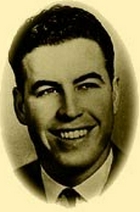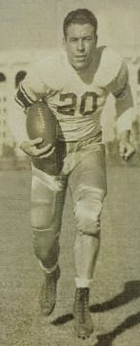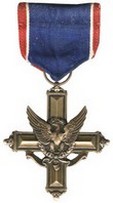Alex Box
| Date and Place of Birth: | August 5, 1920 Quitman, MS |
| Date and Place of Death: | February 19, 1943 Tunisia, North Africa |
| Baseball Experience: | College |
| Position: | Outfield |
| Rank: | First Lieutenant |
| Military Unit: | 1st Engineer Combat Battalion, 1st Infantry Division US Army |
| Area Served: | Mediterranean Theater of Operations |
Alex Box was an outstanding LSU athlete whose wartime gallantry would earn him the Distinguished Service Cross but would ultimately cost him his life.
Simeon A. "Alex" Box was born in Quitman, Mississippi on August 5,
1920. His father, Sam, was a machinist and worked in a lumber mill. The
family moved to Laurel around 1933, and he attended George S. Gardiner High School in
that town. A naturally gifted athlete, he was all-state in football, and
state champion in the 100- and 200-yard dashes and the discus throw.
Alex also played on a semi-pro baseball team put together by the
Masonite sawmills company and attracted interest from the Cincinnati
Reds before accepting a football scholarship from Louisiana State
University (LSU) in 1938.
Box, a handsome and popular figure on campus who majored in petroleum
engineering, played wingback on the football team but the disclocation
of his shoulder in a game against Holy Cross in 1939 ended his football
career. Turning to baseball in his sophomore and senior years, he played
right field and batted in the cleanup position. On occasion, his
shoulder would dislocate on his throw from the outfield. The infielders
would go out and pull it back in place, and he would stay in the game.
During this time he met Earle Hubert, an attractive young
student from Plaquemine, Louisiana, and they developed a close
relationship.
Box pursued his advanced ROTC studies at LSU in the engineering regiment
and upon graduation as a lieutenant early in 1942 he entered the Army.
Box took basic training with the 1st Infantry Division at Camp Blanding,
Florida and completed training at Fort Indiantown Gap, Pennsylvania.
During this time Alex and Earle agreed to marry when she completed her
degree, but on August 2, 1942, Box left the USA bound for Britain.
Based at Tidworth Barracks and serving with the 1st Engineer Combat
Battalion of the 1st Infantry Division, First Lieutenant Box continued
training until November 1942, when the entire division aboard 22 ships,
left England bound for North Africa. Operation Torch was the Allied
invasion of North Africa. For the 1st Infantry Division, their job was
to overcome the Vichy French forces at Oran, Algeria.
On November 7, the division disembarked at Oran and met with determined
resistance. The 1st Engineer Combat Battalion's primary role was of road
maintenance and mine warfare. It's secondary role was fighting as
infantry. It was in this role on November 9, 1942, at Arcole, Algeria,
that Lieutenant Box - a platoon leader - used a half-track to destroy
enemy machine guns emplacements that were blocking the 1st Infantry’s
advance. For his extraordinary heroism he was awarded the Distinguished
Service Cross - the second highest military decoration of the US Army.
The following year Alex was fighting German forces in Tunisia. In
February 1943, Field Marshall Rommel launched an all-out attack against
the American forces at Kasserine. Alex Box was involved in laying
minefields and preparing road blocks, when, on February 19, a mine was
accidently discharged. He was killed instantly, along with four other
soldiers. He is buried at Plot I, Row 5, Grave 1 in the North African American Cemetery in
Carthage, Tunisia.
"The deeds and death of your son have gone to make up the spiritual
background that is this country," wrote Brigadier General Theodore
Roosevelt - at the time second in command of the 1st Infantry Division -
in a letter of condolence to Box's mother, Mattie Box.
R.H. Watkins, superindent of schools in Laurel, Mississippi, eulogized Box
as a "perfect example of an athlete, a Christian gentleman, a scholar
and a soldier ... His beautiful life may be compared to a great piece of
music which ends on a high note."
In May 1943, the LSU Board of Supervisors voted unanimously to name the
university's baseball stadium for Box. "For the first time in the
school's history," observed the student newspaper, The Reveille,
"the service and memory of the military hero came to be esteemed so
highly that a structure on the campus was named in his honor." The LSU
Tigers baseball team continue to play at Alex Box Stadium today.
In December 1943, the flagpole quadrangle at Laurel Army Air Field
was renamed "Alex Box Quadrangle" in his honor. Lieutenant-Colonel
Harrison W. Wellman, Jr., base commander, made the dedicatory address
with members of the Box family in attendance as honored guests.
In 1991, the Box family made a special presentation of his personal
memorabilia to LSU. The items, enclosed in a specially-constructed glass
case, are permanently housed in the LSU Athletics Hall of Fame and
Museum.
In 2009, the state-of-the-art New Alex Box Stadium was opened, ensuring
that the name of LSU’s WWII-baseball hero lives on for many years to
come.
Lt. Box's DSC citation reads in part:
" ... on November 1942, near Arcole, Algeria, Lt. Box distinguished himself by extraordinary heroism in action against an armed enemy. When the advance of his battalion and an attached artillery battalion was stopped by determined antitank, machine gun and small arms fire on the outskirts of Arcole, Lt. Box without hesitation, of his own voliation and at the risk of his own life, volunteered to go forward ... in a half track vehicle ... overran and destroyed with hand grenades two strong enemy machine gun positions flanking the road. Then proceeded through the town machine gunning all resistence encountered and returned through severe machine gun fire and rifle fire to the immobilized column. It was the bold action of Lieutenant Box which contributed largely to the withdrawal of the enemy ..."


A night game at LSU's Alex Box Stadium
Sources:
Baton Rouge State Times, August 6, 1988
Tiger Rag (by Carl Dubois), February 12, 2010
Thanks to LSU baseball publicist, Bill Franques, for help with this biography.
Date Added: June 8, 2012 Updated: July 5, 2013
Baked Potatoes and the Baseball Potato:
Baked Potato Recipe |
Dave
Bresnahan Potato at Baseball Reliquary
Baseball's Greatest Sacrifice is associated with Baseball Almanac
Baseball's Greatest Sacrifice is proud to be sponsored by




